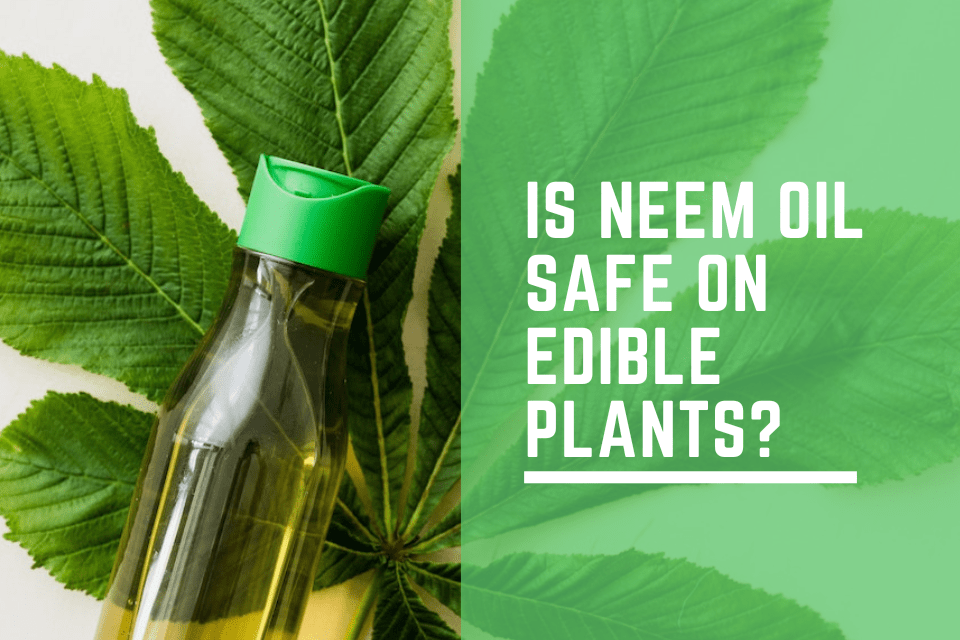Yes, neem oil is safe on edible plants. In fact, it is often used as a natural pesticide for organic farmers. Neem oil is made from the seeds of the neem tree and has been used in India for centuries as a medicinal herb.
Neem oil is a natural, plant-based oil that has a wide range of uses. It’s been used for centuries in India and other parts of Asia for its medicinal properties. Today, neem oil is gaining popularity in the western world as an effective and safe treatment for a variety of conditions, including skin disorders, hair loss, and even some types of cancer.
But what about using neem oil on edible plants? Is it safe? The short answer is yes, neem oil is safe to use on edible plants.
In fact, it can be a very effective way to control pests and diseases. Neem oil works by disrupting the life cycle of pests, preventing them from reproducing. It also has antibacterial and antifungal properties that can help to protect your plants from diseases.
When using neem oil on edible plants, it’s important to follow the instructions carefully. Make sure you only use products that are specifically labeled as safe for food crops, and always wash your hands after handling neem oil products. If you have any concerns about using neem oil on your edible plants, talk to your doctor or a certified organic grower before proceeding.
How to Use Neem Oil to Control Pests & Diseases?
Can I Use Neem Oil on Vegetable Plants?
Yes, you can use neem oil on vegetable plants! In fact, it’s a good idea to use neem oil on all of your plants, both inside and outside of the house. Neem oil is a natural pesticide that will help keep your plants healthy and free of pests.
What Plants Should You Not Use Neem Oil On?
There are a few plants that you should not use neem oil on. These include: impatiens, fuchsias, hibiscus, and roses. The reason being is that neem oil can cause leaf damage and bud drop on these plants.
If you absolutely must use neem oil on these plants, be sure to do a patch test first and only apply it during cooler months.
Can You Eat Basil After Spraying Neem Oil?
If you’re wondering whether you can eat basil after spraying neem oil, the answer is yes! Neem oil is a natural product made from the seeds of the neem tree, and it’s perfectly safe to use around food. In fact, neem oil has been used as a traditional cooking ingredient in India for centuries.
However, it’s important to note that pure neem oil can be quite strong and bitter-tasting, so you may want to dilute it before using it in your cooking. Additionally, make sure to only use cold-pressed or virgin neem oil; other types of neem oil may contain harmful chemicals.
How Long to Wait to Eat Vegetables After Spraying With Neem Oil?
If you’re planning to spray your vegetables with neem oil, make sure to do it at least a week before you plan to harvest them. Neem oil is a powerful insecticide, and while it’s safe for humans and animals, it can be harmful if ingested in large quantities. By waiting a week or more after spraying, you’ll give the neem oil time to break down and become less potent.

How to Wash Neem Oil off Vegetables?
Neem oil is a natural, botanical product made from the seeds and leaves of the neem tree. It has been used in India for centuries as an organic pesticide and insecticide. Neem oil is effective in controlling a wide variety of insects, including aphids, whiteflies, mites, and scale.
It is also effective against fungal diseases such as powdery mildew and black spot. To use neem oil on vegetables, mix 1 teaspoon of neem oil with 1 tablespoon of soap or detergent and 1 gallon of water. This solution can be sprayed onto vegetables to kill pests and diseases.
Be sure to wash the vegetables thoroughly after spraying them with the neem oil solution to remove any residue before eating them.
What Plants Not to Use Neem Oil on?
Neem oil is a great natural alternative for pest control on plants, but there are a few plants that it should not be used on. These include:
- Fuchsias
- Hibiscus
- Begonias
- Gardenias
- Lantanas
These plants are all sensitive to neem oil and it can cause them irritation or even kill them. So, if you’re using neem oil for pest control, be sure to avoid these plants!
Is Neem Oil Safe for Herbs?
If you’re looking for an all-natural way to protect your herbs from pests, neem oil is a great option. Neem oil is derived from the seeds of the neem tree, and has been used in India for centuries as a natural insecticide. It’s effective against a wide variety of insects, including aphids, whiteflies, and spider mites.
Neem oil works by interfering with the insects’ ability to reproduce. When applied to plant leaves, it prevents the eggs of many species of insects from hatching. It also repels adult insects, making them less likely to lay eggs on treated plants.
In addition to being an effective insecticide, neem oil is also safe for humans and animals. It’s non-toxic and doesn’t leave behind any harmful residues. You can apply it directly to your plants without worry about harming yourself or your family members if you accidentally ingest some of the treated leaves.
If you’re looking for a natural way to keep your herbs free of pests, give neem oil a try!
Conclusion
Neem oil is a natural, biodegradable product made from the seeds of the neem tree. It has been used for centuries in India and other countries for its many benefits. Neem oil is safe to use on edible plants, including fruits and vegetables.
It can help to control pests, diseases, and fungal growth. Neem oil is also known to improve plant growth and yield.
